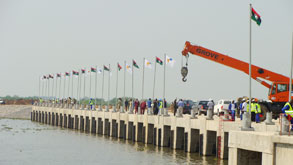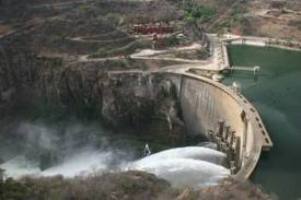Visitors arriving in Nsanje, the sleepy capital of Malawi’s southernmost district, are greeted by a large yellowing billboard announcing: “The dream becomes reality. Nsanje Port opens October 2010.” But those who go to the port will find little more than a concrete quay with a couple of dozen mooring posts, and a few fishermen manoeuvring crude dug-out canoes through the murky brown waters of the Shire River.

For former President Bingu wa Mutharika, the construction of an inland port at Nsanje meant linking land-locked Malawi with the Indian Ocean port of Chinde, 238 kilometres away in neighbouring Mozambique, through the Shire-Zambezi Waterway project. The aim was to reduce the high costs of importing and exporting goods by road via Malawi’s commercial capital, Blantyre and the Mozambican port city of Beria – a round trip of about 1,200 kilometres.
But Mutharika’s enthusiasm for the project was not matched by his counterpart in Mozambique. As Mutharika presided over the official opening of the port in October 2010, flanked by former Zambian president Rupiah Banda and Zimbabwean president Robert Mugabe, he had to admit to the crowd gathered to witness the arrival of the first barge that the Mozambican government had called for environmental and feasibility studies before it would allow any barges to navigate the Zambezi River portion of the waterway, which flows through its territory.
Since then, the port has sat idle, gradually shedding nuts and bolts to vandals and becoming the focus of increasing resentment from local people promised jobs and development. Nsanje resident Rose Samuel, 32, said the only improvement to the town has been the paving of a 50-km stretch of road linking Nsanje with Bangula, the next town. Much of the remaining 130km of road between Nsanje and Blantyre has yet to be tarred.
“There’s no evidence that Nsanje will ever be a big port city,” said Samuel. “We’ve heard that down the river it’s so narrow that a ship can’t pass, so we don’t think [the port] will be in use anytime soon.”
Land grabbed
Samuel has more reason to be bitter than most. Her family was among about 300 that used to farm land now occupied by the port. In early 2010 the government communicated through the local Traditional Authority [the chief], that the land was needed for the port and families would be compensated according to the size of their plot.
“Those families affected had to uproot maize that was already planted,” said Samuel. “Some were old people who left crying – that was their only source of income.”
Samuel’s family received a mere 5,000 kwacha (US$20) for one hectare of ancestral land, for which they had no title deeds. Her family now survive by doing piece-work and renting a small plot of land to grow food. “The weather here is bad always, and most of the time we live on potatoes. By the river it was wetter and the soil was better,” she said.
Many others have yet to receive anything. “People are worried that if they can grab land without paying, what will stop them removing more people from the area.”
Her concern is justified. Townspeople have been told by the Traditional Authority not to build any new houses because the land has been earmarked for development, and Nsanje’s District Commissioner, Rodney Simwaka, told Face Of Malawi that his office has received 4,000 applications for land from developers who are banking on the port eventually becoming operational.
Simwaka said the applications had not yet been processed but village headman Black Richman Khembo told Face Of Malawi, “Lots of land has been bought by rich people hoping to make money. So far they are letting people remain on the land, but someday they will probably kick them off.”
Project shelved
Simwaka declined to comment on recent statements by Jerry Jana, Director of Economic Affairs for the People’s Party, Malawi’s new ruling party following Mutharika’s unexpected death in April 2012, that long-term projects like the Nsanje port would be shelved for the time being while the government focused on issues of immediate concern like the country’s crippling shortages of fuel and foreign exchange.
“We need full support of the Mozambican authorities to go ahead,” Jana told Face Of Malawi, adding that the requested environmental impact and feasibility studies had yet to be carried out.
The African Development Bank (AfDB) has agreed to fund the feasibility study that formed part of the Memorandum of Understanding (MoU) on the Shire-Zambezi Waterway project signed by Malawi, Mozambique and Zambia in April 2007.
Responding by email to questions from Face Of Malawi, AfDB’s resident representative for Malawi, Andrew Mwaba, said the Southern African Development Community (SADC), the executing agency for the project, is “working on fulfilling conditions precedent to the first disbursement [of funding for the feasibility study],” and that the study was proceeding. “The project is in the interest of three governments and shelving [it] will be against the MoU the three governments signed.”
Village headman Khembo was among those who lost land when the port was built, but unlike Samuel, he holds on to the hope that the port will eventually open and provide opportunities and employment, “if not for me then maybe my children”. Lack of jobs has already pushed two of his eight children to leave Nsanje, one for South Africa and the other for Mozambique.
“If the port starts operating, Nsanje will change for the better,” he said. “Then I won’t mind about my land.”

.jpeg&w=60&q=100&h=60)




.jpeg&w=60&q=100&h=60)





